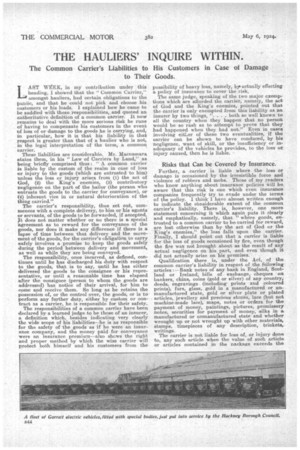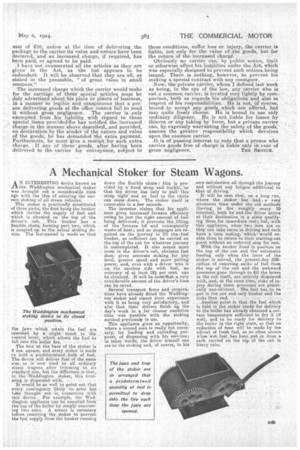THE HAULIERS' INQUIRE WITHIN.
Page 30

Page 31

If you've noticed an error in this article please click here to report it so we can fix it.
The Common Carrier's Liabilities to His Customers in Case of Damage to Their Goods.
LAT WgEK, in my contribution under this heading, I shoWed that the "Common Carrier," amongst hauliers, had certain obligations to the Public, and that he could not pick and choose his customers or his loads. I explained how he came to be saddled with the,se.responsibilities,.and quoted an authoritative definition of a common carrier. It now remains to deal with the more serious risk he runs of having to compensate his customers in the event Pf loss of or damage to the goods he is carrying, and, in particular, how it is that his liability in that respect is greater than that of a haulier who is not, in the legal interpretation of the term, a common carrier.
These liabilities are considerable. Mr. Ma,cnamara states them, in his "Law of Carriers by Land," as being briefly comprised thus : "A. common carrier is liable by the custom of the realm in case of loss or injury to the goods (which are entrusted to him) unless the loss or injury arises from (1) the act of God, (2) the King's enemies, (a) contributory peghgence on the part of the bailor (the person who entrusts the goods to the carrier for conveyance), or 1(4) inherent vice in or natural deterioration of the thing carried."
The carrier's responsibility, thus set out, commences with a complete delivery, to him or his agents or servants, of the goods to be forwarded, if accepted. Xt does not matter whether or no there is a special hgreement as to reward for the conveyance of the goods, nor does it make any difference if there is a lapse of time between that delivery and the movement of the goods, for the carrier's obligation to carry safely involves a promise to keep the goods safely during the period between delivery and movement, as well as while they are being conveyed. The responsibility, once incurred, as defined, continues until he has discharged his duty with respect to the goods, that is to say, until he has either delivered the goods to the consignee or his representative, or until a reasonable time has elapsed after the consignee (person to whom the goods are addressed) has notice of their arrival, for him to come and receive them. So long as he retains the possession of, or the control over, the goods, or is to perform any further duty, either by custom or contract as a carrier, he is responsible for their safety.
The responsibilities of a common carrier have been declared by a learned judge to be those of an insurer, a definition which, besides indicating very clearly the wide scope of his liabilities—he is as responsible for the safety of the goods as if he were an insurance company, and the money paid for conveyance were an insurance premium—also shows the riga and proper method by which the -wise carrier will protect both himself and his customers from the
possibility of heavy loss, namely, bp actually effecting a policy of insurance to cover the risk.
The same judge, speaking of the two major exemptions which are afforded the carrier, namely, the act of God and the King's enemies, pointed out that the carrier is only exempted from this liability as an insurer by two things, `. . . . both so well known to all the country when they happen that no person would be so rash as to attempt to prove that they had happened when they had not." Even in cases involving either of these two eventualities, if the carrier can be shown to have conduced, by his negligence, want of skill, or the insufficiency or inadequacy of the vehicles he provides, to the loss or, injury caused, then he is liable.
Risks that Can be Covered by Insurance.
Further, a carrier is liable where the loss or damage is occasioned by the irresistible force and violence of robbers and mobs. Those of my readers who know anything about insurance policies will be aware that this risk is one which even insurance companies frequently try to evade under the terms of the policy. I think I have almost written enough to indicate the Considerable extent of the common carrier's liability. There is however, one more statement concerning it which again puts it clearly and emphatically, namely, that "where goods, entrusted to a common carrier to be carried for reward, are lost otherwise than by the act of God or the King's enemies," the "loss falls upon the carrier. Finally, I should point out that a carrier is liable for the loss of goods occasioned by fire, even though the fire was not brought about as the result of any actual negligence on his part, and even though it did not actually arise on his premises. Qualification there is, under the Act, of the common carrier's liability in respect of the following articles :—Bak notes of any bank in England, Scotland or Ireland, bills of exchange, cheques on bankers, china, coins (gold or silver) of any country; deeds engravings (including prints and coloured prints), furs, glass, gold in a manufactured or unmanufactured state, gold or silver plate or plated articles, jewellery and precious stones, lace (but not machine-made lace), maps, notes or orders for the payment of money, paintings, pictures, promissory notes, securities for payment of money, silks in a manufactured or unmanufactured stateand whether wrought up or not wrought up with other materials, stamps, timepieces of any description, trinkets, writings. The carrier is not liable for loss of, or injury done to, any such article when the value of such article or articles contained in the package exceeds the
sum of £10, unless at the time of delivering the package to the carrier its value and nature have been declared, and an increased charge, if required, has been paid, or agreed to be paid. I have not enumerated all the articles as they are given' in the Act, as the hit appears to be redundant. It. will be observed that they are all, as stated in the preamble, "of great value in small compass." — • • • • •
• The increased charge which the carrier would make for the carriage of these special articles must be duly advertised about his place Or places of business, in a manner so legible and ,cOuspietious that a person,delivering goods at the Office cannot fail to read it without gross negligenee. The carrier is only exempted from his liability with regard to these Special items providedlIte has notified the :increased charge in the manner above deseribe.d, and provided, on deeliration by the'sender of the nature and value of the goads; he has demanded the. extra payment: Fiirtherniore, he must kiVe a redeipt for suCh extra charge If any of these -goods, after having been delivered to the carrier for conveyance, subject to
these conditions, suffer loss or injury, the carrier is liable, not only for the value of the goods, but for the return of the increased charge. Obviously no carrier can, by public notice, limit or otherwise affect his liabilities under the Act, which Was especially designed to prevent such noticesMeing issued. There is nothing, however, to prevent his making a special contract with any consignor.
:Now, the private carrier, whom I defined last week as being, in the eye of the law, any carrier Who is not a common ca,rrier, is treated very lightly by cera:7pariSon,'both as regards his obligations and also in respect of his responsibilities. He is not, of' course; bound to accept any goods„. which are offered, but may quite freely choose. Ho is bound to use only ordinary diligence. He is ...liable for losses by thieves or any taking by force, but a private carrier . can, by expressly warranting the safety of the goods,assume the greater responsibility which devolves Upon the common carrier.
This of passing interest to note that a person who carries goods free of charge is liable only in ease of
groSs negligence. TELE SiOTCH.


































